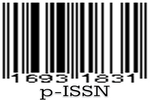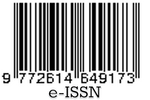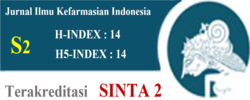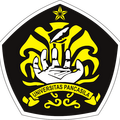Effect of Fish Oil in Inhibiting Colorectal Preneoplasia of Mice Induced by Azoxymetane and Dextran Sodium Sulfate
Abstract
Epidemiologic studies of dietary marine n-3 fatty acids and risk of colorectal cancer have been inconsistent. The study was conducted to understand the inhibitory effect of fish oil in mice with colorectal preneoplasia induced by azoxymethane (AOM) and dextran sodium sulfate (DSS). In this study, Balb/c mice was induced by AOM 10 mg/kg body weight followed by administration of 1 % DSS during a week. Fish oil administrated orally at a dose of 1.5, 3, and 6 mg per day. Histopathological examination of the colon tissue (hematoxylin-eosin staining) was done by counting the number of inflammation, and hyperplasia foci, the number of mitosis epithelial cells, and the scores of dysplasia in ten visual fields. In the second month, decreasing in the number of inflammation foci occurred between the control and low dose groups with medium and high dose groups (p<0,05). While in the third and fourth month, decreasing in the number of inflammation foci were observed in all treatment group (p<0.001). The number of mitotic colonic crypt epithelial cells was statistically significant between control group and treatment groups, initially observed since the second month. In the second month to the fourth month, generally increasing of doses of fish oil has decreased the number of hyperplasia foci. Our research indicates that fish oil also inhibits the occurrence of dysplasia. In the third and fourth month, dysplasia was found in the control group. Dysplasia was found only in the fouth month in the treatment group.
Licencing
All articles in Jurnal Ilmu Kefarmasian Indonesia are an open-access article, distributed under the terms of the Creative Commons Attribution-NonCommercial-ShareAlike 4.0 International License which permits unrestricted non-commercial used, distribution and reproduction in any medium.
This licence applies to Author(s) and Public Reader means that the users mays :
- SHARE:
copy and redistribute the article in any medium or format - ADAPT:
remix, transform, and build upon the article (eg.: to produce a new research work and, possibly, a new publication) - ALIKE:
If you remix, transform, or build upon the article, you must distribute your contributions under the same license as the original. - NO ADDITIONAL RESTRICTIONS:
You may not apply legal terms or technological measures that legally restrict others from doing anything the license permits.
It does however mean that when you use it you must:
- ATTRIBUTION: You must give appropriate credit to both the Author(s) and the journal, provide a link to the license, and indicate if changes were made. You may do so in any reasonable manner, but not in any way that suggests the licensor endorses you or your use.
You may not:
- NONCOMMERCIAL: You may not use the article for commercial purposes.
This work is licensed under a Creative Commons Attribution-NonCommercial-ShareAlike 4.0 International License.





 Tools
Tools





















